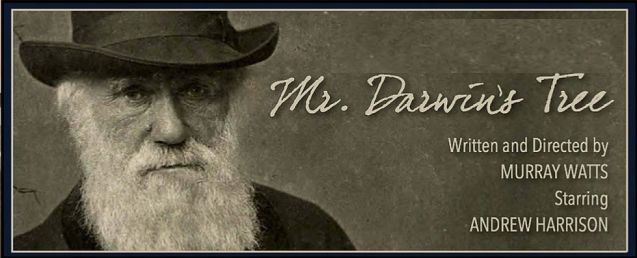At last Friday’s presentation of “Mr. Darwin’s Tree” in the Lab Theatre, British actor Andrew Harrison portrayed the titular naturalist. But that was not his only role — far from it. According to the constraints of a one-man show, Harrison embodied a whole cast of characters.
“It all begins in a garden,” he said. And then, as if transported from the early nineteenth century, the young Charles Darwin appeared. The child grew into a man, and an irate father, intent on persuading his scientist son into the clergy, joined him onstage. Then Darwin’s wife entered; then his children, his mentors, his friends, his rivals. By play’s end, Harrison had played over a dozen characters, all interacting and conversing with one another.
“The superhero tonight was Andy in being able to do all that,” said playwright Murray Watts at a conversation after the show.
The forces that brought “Mr. Darwin’s Tree” to Calvin, however, were far from a one-man effort. The play was originally performed at London’s Westminster Abbey in 2009, just a few feet away from Charles Darwin’s grave. But, just as the naturalist’s legacy extends miles beyond the United Kingdom, this production can create conversations in the United States as well as in Europe. A host of organizations sponsored its Christian college tour of North America — Scholarship and Christianity in Oxford (SCIO), the Council for Christian Colleges and Universities (CCCU) and the Templeton Religion Trust.
In Grand Rapids, science-and-faith advocacy group BioLogos worked in concert with the theater department to bring “Mr. Darwin’s Tree” onto Calvin’s campus. After the show, BioLogos also hosted a panel with the playwright and members of the academic and scientific community.
Thankfully, the play’s simple staging allows easy reconstruction across the nation and onto the Lab Theatre stage. On Friday, two chairs framed the storytelling space, a desk served as the midpoint of Darwin husband-wife debates, and a ladder boosted the scientist to the dizzying heights of theory-creation and revolution-making.
“Mr. Darwin’s Tree” opens with a little boy in a garden, fascinated by the creatures that crawl along the leaves. It ends with a old woman in a garden, pondering the eternal fate of her agnostic husband. Between these bookends, Harrison plunged the audience into Darwin’s world — his childhood, his famous scientific voyages, his marriage, his daughter’s early death, his constant internal struggles. After seventy-five minutes of storytelling, “Mr. Darwin’s Tree” concluded with an ever-relevant coda on the naturalist’s legacy. In his own day, “The Origin of Species” provoked strong reactions, and the controversy surrounding Darwin’s evolutionary theory continues to the present.
“So much of Darwin [today] is a caricature,” commented Dr. Stan Rosenberg, SCIO founder and executive director, during the post-show panel. As the play does not endorse a single interpretation of Darwin’s theory, he believed, it creates an opportunity to better engage the man’s complex life and legacy. “This gives you a human, and humans create conversations.”
In a talk to the Calvin Theatre Company last Thursday, the show’s playwright echoed Rosenberg’s concern for genuine, gracious dialogue. Watts compared the human emotional spectrum to a piano, and he noted Christians’ tendency to fear the somber black keys and overemphasize the jubilant white keys.
“God is not afraid of the whole piano,” he said.








